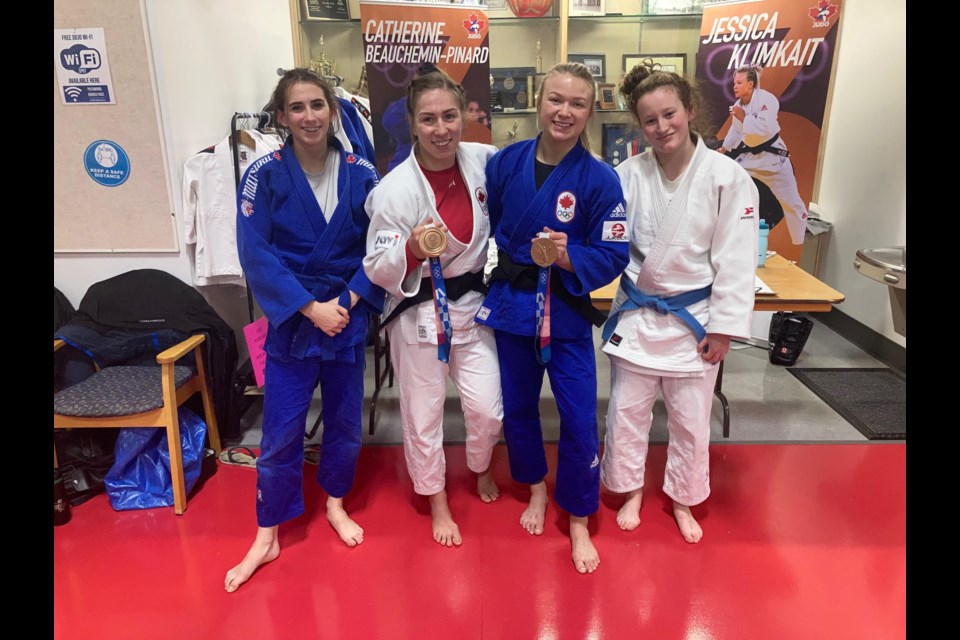Judo in Moose Jaw has a long history. Avery Gibney and Kolbi Fenrick are helping to carry the tradition forward with the dedicated support of their coaches and club.
Moose Jaw’s judo tradition has been around since the 1940s in one form or another. Since the mid-eighties, the club has been known as Moose Jaw Koseikan Judo Club. It is currently run by Jim and Michelle Wiens. All the instructors at Koseikan Judo Club are volunteers who give thousands of hours to their sport.
The club is a member of Judo Saskatchewan and Judo Canada, which is recognized as the governing body of judo in Canada. Koseikan Judo Club’s space is the only full-time, dedicated dojo in the province. Jim Wiens currently serves as the vice-president of Judo Saskatchewan.
The club accommodates both recreational and competitive members. The high-performance competitive class is coached by Destiny Gibney, a former Junior National Champion and Senior National Medalist and a member of the Judo Saskatchewan Provincial Coaching Team.
Avery Gibney and Kolbi Fenrick are both 15 and have both been practicing judo for seven years. They are currently accumulating what judo athletes (judoka) call “mat time” in order to advance from blue to brown belt.
“Unfortunately, the pandemic did disrupt our promotion schedule,” their coach Destiny told MooseJawToday.com, “or else they would have their brown belts now.”
COVID may have slowed them down, but it has not stopped the duo. Avery is currently ranked seventh in Canada in the U18, sub-48kg class. Kolbi is ranked third in Canada in the U18, sub-52 kg class. This is their first year of U18 competition.
Both girls are going to the Elite 8 National Championships, two of three Saskatchewan U18 judoka to be selected.
“Within judo, the Elite 8 is the closed championship, so it’s invitation-only,” Destiny Gibney explained. “Only the top eight competitors within each age and weight class are invited, so that’s exciting.”
The championship will be held in Edmonton on the weekend of 15-16 January. The other Judo Canada national championship event is an open tournament held in May.
To qualify for the Elite 8, Kolbi and Avery have stuck to their training through the pandemic and ranked highly in their competitions on the Judo Canada National Circuit.
“They remained dedicated and did Zoom training with Team Sask multiple times a week along with all the strength and conditioning available to them,” Destiny said, “despite having no idea as to when their next opportunity to compete would be and despite having their belt promotions delayed.”
A typical competition season for Avery and Kolbi (before COVID) would include five to six tournaments on the National Circuit. These tournaments are held in BC, Alberta, Saskatchewan, Ontario, Quebec, and Manitoba. Avery and Kolbi travel to these tournaments with Team Saskatchewan.
Both girls train multiple times a week in judo, including Judo Sask provincial training in Pense. They supplement their judo with strength and conditioning workouts and attend provincial training camps in Saskatchewan, Alberta, and BC.
At the most recent Alberta Provincial Training Camp, Avery and Kolbi were able to get instruction from Canada's two recent Olympic Judo Bronze Medalists: Jessica Klimkait and Catherine Beauchemin-Pinard.
Avery and Kolbi's competition schedule for the next six months will include:
- January
- Elite 8 National Championships
- Manitoba Open (Winnipeg)
- February
- Alberta Tournament
- March
- Pacific International Judo Tournament (Vancouver)
- Edmonton International Judo Tournament
- May
- Open National Championships (Montreal)
- July
- US Open Judo Championships (Florida)




